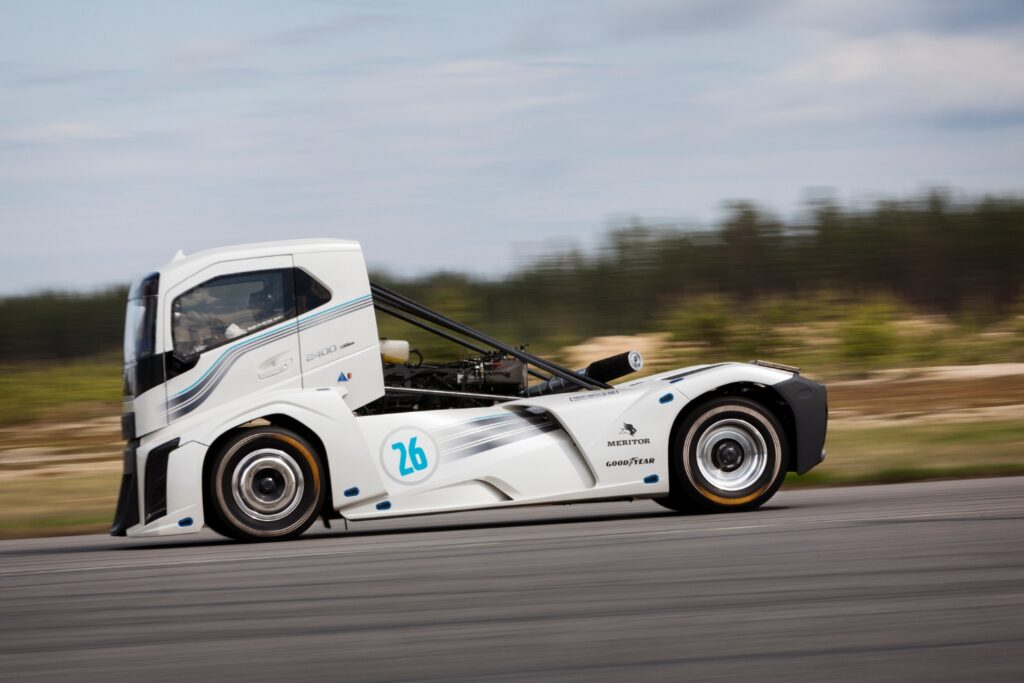Developed by Volvo in 2016, the Iron Knight is still the holder of two world speed records, which help support its title as the fastest truck in the world.
It seems strange that the brand that limited the maximum speed of its passenger models to 180 km/h for safety reasons has developed a true asphalt “monster” with speed records in mind. But The Iron Knight is indeed a model for strong emotions. A kind of heavyweight supercar, where the Swedish brand demonstrates its technological capabilities.

The truck record holder mounts the “same” turbocharged diesel engine used in the Volvo FH series heavy-duty trucks: the D13 unit, with 13.0 liters and six inline cylinders, which in the production version “stops” at 750 hp. But here it has been enhanced with four turbochargers and a gigantic water-cooled intercooler, and the result is remarkable: 2400 hp and 6000 Nm of maximum torque, which, considering the 4.5 tons it pulls, represents a power-to-weight ratio of 1.9 kg/hp, similar to that of a McLaren P1!
These impressive numbers allowed The Iron Knight to set several track records in Sweden: it covered the start kilometer (0-1000 m) in 21.29 seconds, at an average speed of 170 km/h; and covered the 0-500 m in 13.71 seconds, at an average speed of 131.29 km/h. All values were certified by the International Automobile Federation (FIA), including the maximum speed certification of 276 km/h, a mark that has not been surpassed by any other truck to this day.
To put all the power on the asphalt, The Iron Knight uses a transmission identical to that used in mass production models: the I-Shift Dual Clutch pilot-controlled gearbox, with twelve gears and dual clutch, has been specifically reinforced to handle the high torque of the toned D13 engine, capable of faster and smoother gear shifts.

In addition, Volvo Trucks engineers reinforced the chassis of the Iron Knight to ensure superior rigidity. The engine was installed behind the cabin, closer to the rear axle, for better mass balance, unlike production units where the engine is mounted under the cab. The electronic management was adjusted and the software reprogrammed to allow maximum performance.
The body of this speed record holder is made of fiber and was designed to offer the least aerodynamic resistance. In addition, the side sections have generously sized air intakes that feed the radiators, ensuring superior and efficient engine cooling.
The Iron Knight is equipped with Goodyear tires, size 315/70 R22.5, on the steering axle, while the rear drive axle wears even more generous tires, size 495/45 R22.5. The tire brand has announced that this model is produced with a sublayer and a tread designed to withstand high temperatures, as well as specific compounds that allow them to withstand high speeds.

It is certain that this truck is a source of development for many improvements to be applied to the new generation of Volvo Trucks models, and the brand does not hide the intention of using The Iron Knight as a “laboratory” to transfer some ideas to production trucks, at a time when Volvo is moving towards electric mobility and the sustainability of its creations. They have even introduced a complete range of electric heavy vehicles, from the FE to the FL, passing through the FH, as well as the specifics of the Volvo Connect digital platform.
Unprecedented experience at the Estoril Circuit
In the experience we had on board the Iron Knight, at the invitation of Auto Sueco Portugal, Grupo Nors, and Goodyear, Swedish driver Boije Overbrink (European champion of truck racing and the man who led Volvo’s heavy vehicle to achieve speed records) was our host behind the wheel, and showed both the acceleration capability of this heavy vehicle and its unique performance. Surprisingly, even with the wet track due to heavy rain at the Estoril Circuit, The Iron Night could only use about 30% of its power and torque – and yet, it didn’t allow us to take a deep breath when Oberbrink stepped on the accelerator to quickly cover the finish line straight of the oldest permanent Portuguese track.

Also worth mentioning are the tires and braking system, which work with great efficiency when it comes to stopping this “monster” of the asphalt, and which looks more like a real race car despite being a truck. Trying to keep the flame of sustainability alive, even in such an extravagant and impressive exercise like a speed record-breaking truck, it is noteworthy that this unique model uses renewable synthetic fuel known as HVO (hydro-treated vegetable oil), also known as “green diesel,” which, according to Volvo Trucks, reduces CO2 emissions by 80%.







